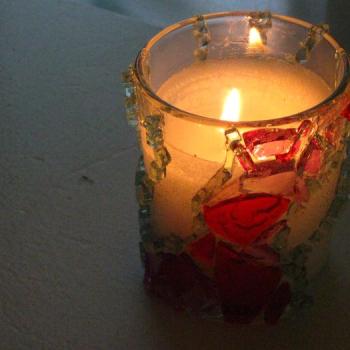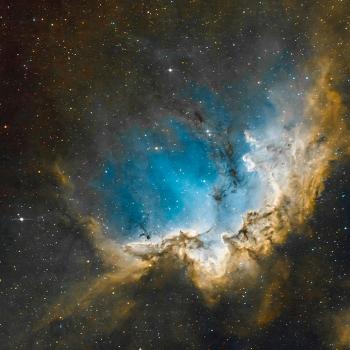You describe Jesus' sacrificial death as being an act of love, rather than an act of justice, as much of Christian theology understands it. Do you think it could in fact be both? Likewise, although many people do blame sin and temptation on the person of Satan rather than taking responsibility for their own human nature, do you think perhaps both could be a source of temptation and attack?
While for many years I understood the atonement only in the terms Anselm of Canterbury gave us—that it was Jesus' death on our behalf instead of our death, where our sin merited that punishment—I have a hard time thinking of the Crucifixion and Resurrection events in justice terms now. You and I both know we are imperfect beings, prone to sin, prone to disordered desires. Neither of us has any misconception that we are capable of perfection, however loosely defined. If we know this about ourselves, I can't imagine a God who would create us so, also knowing this about human nature, and nonetheless condemning humankind to death and eternal destruction because of it.
I am much more drawn to Abelard's idea that Jesus is our perfect example of fidelity to God's purpose even unto death, and even more to the belief expressed by Jürgen Moltmann and other theologians that what is happening in these actions centers more on the Resurrection than on the Crucifixion. Moltmann argues that in raising Jesus, who has been tortured and executed by the powers of this world, God is inaugurating a change in the way the world works. God is showing that sin and death do not get the last word, that God is beginning the great reclamation of the Cosmos for love and life. The Greek icon paintings of the Resurrection show Jesus pulling Adam and Eve from the grave as he rises from his own tomb, and that for me is what is happening here: the Resurrection begins God's rescue of the world.
As for Satan, I'm not much interested in him. Or it. The devil doesn't make an appearance in the Nicene, Apostles', or Athanasian Creeds, so belief in the character of Satan doesn't seem to be one of those things necessary to salvation. There is evil, of course, undeniably, and it's certainly more interesting if there's a fallen angel or cosmic evil or what have you behind it. If there is one, he, she, or it certainly could be a figure who tempts humankind.
Almost everything we believe about Satan comes from tradition and from John Milton; very little of what we think we know about Satan is actually in the Bible, and much of it seems to be used by the writers of the gospels to demonize people who don't believe as they or their early faith communities do.
But I do like John Milton. I wish there were a Satan like his.
You cited Diana Butler Bass, who describes art as a place where humanity and divinity come into contact. Some churches hold to the theology that when artists create a piece of art in a state of spiritual meditation, they are inviting the viewer into the same spiritual experience they were having while they created it. Do you think this type of experience could be compared to your moment viewing the El Greco?
In my life as a fiction writer, I have experienced this amazing feeling of seeing things come together, the unseen becoming seen when the creative process works. I've also experienced this trance state of the artist that I think is very close to prayer and may in fact be prayer, whether or not we call it that. I don't know that any of this translates to my readers directly—like we were connected by an Ethernet connection, say—but I do believe that my emotional state and my spiritual awe will translate in some way if I tell the story well. I'm much less comfortable trying to explain this than I am just trying to make good art, and I fear that if people are too conscious about what they're doing—or hope to be doing—it may not work at all.
As a consumer of great art, I rarely if ever know the artist's state of mind—or spiritual commitment—when he or she was creating, but when it's powerful, I do get a sense of deep connection with my humanity, and with the source of Truth and Beauty that feels like prayer again, if prayer is an awareness of the Divine Presence. However it happens, it matters. Literature, art, and culture have been primary carriers of sacred meaning for me, which is why I've written about it so often and continue to teach and speak about it.
Along those lines, you mentioned David Dark's vision for a new kind of culture of Christianity. What are some ways you envision that this might look, and do you think it could have a profound effect on areas like the arts and society?
Well, as I said, I think first that good art comes from a place of truth and beauty. Experience tells me that it rarely comes from a conscious decision to evangelize or to prove something. Anything. Since I do write and speak about art, Christian and otherwise—and since I write fiction or memoir as an artist who happens to be Christian—I do have some perspective from both sides of the question, the creative and the critical. I find that my own aesthetic experiences are much more powerful in stories, art, or music that don't feel to me as though they are pre-programmed. I would have liked Avatar much better, for example, if I hadn't felt a bit hit over the head by its environmental message, however much I might agree with it.




